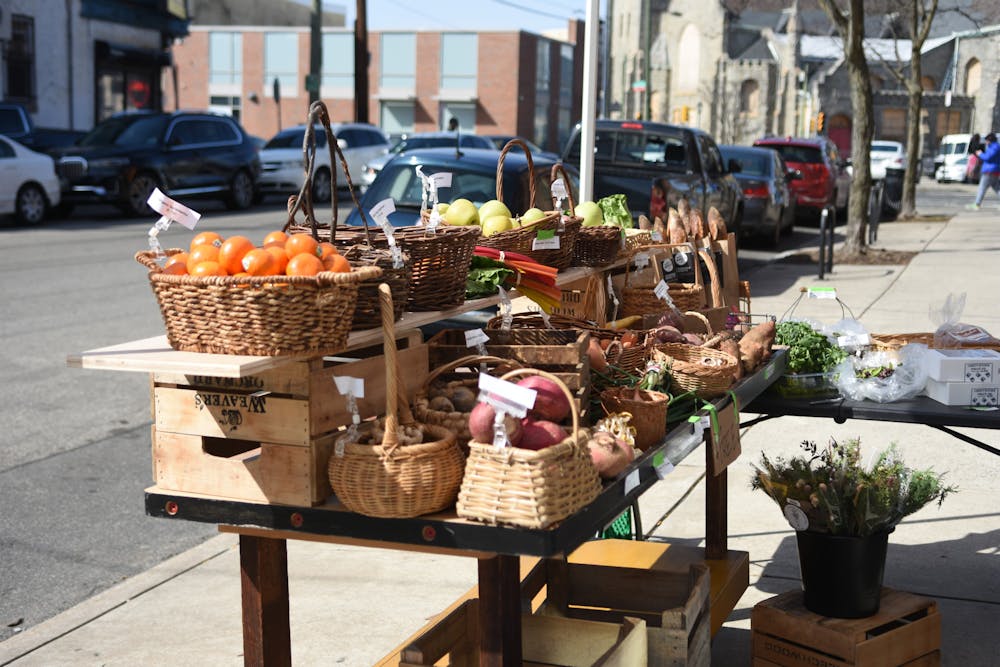Where most park their car, here is housed a selection of cheeses; in place of old storage boxes full of clothing and knick–knacks, here instead is a display of Japanese sweet potatoes, cameo apples, and golden enoki mushrooms. Customers have made it a weekly ritual to visit this disappearing market to fulfill their every grocery need.
This is Pandemic Pantry, nicknamed PanPan. It was founded during the first week of the COVID–19 shutdown by Ann Karlen and friends. Between the fact that Karlen’s cheese business, Third Wheel Cheese, sold mostly to restaurants about to undergo temporary lockdown, as well as the pandemic providing an abundance of free time, PanPan was born. West Philly’s Pandemic Pantry has managed to transform a small garage space into a fully functioning farmer’s market based on principles of sustainability, community, and quality.
PanPan began as nothing more than a way for Karlen and friends to easily retrieve their weekly groceries, as well as maintain relationships that she had established through her previous work with numerous farmers that ship to Philadelphia. However, after recognizing a city–wide deprivation of human connection and grocery shopping ability, the concept flourished into the successful buying club it is today.
Leveraging the connections Karlen has made, PanPan has developed partnerships with distributors both near and far to provide an extensive list of products for weekly customers. Customers receive an email every Monday evening detailing the weekly offerings, which range from produce and bread to coffee and condiments. From there, they can respond with their orders through a Google form. Come Thursday morning, orders are being packed until customers begin to arrive on Friday afternoon. Operations Manager Nick Olkovsky estimates that they receive 150–200 weekly orders, which in 2023 left them with $525,000 in sales.
“It’s a very participatory process,” says Olkovsky. “People give me their feedback, people give me their suggestions, people are very vocal and very involved in what we offer,” says Karlen. For many, it has become its own sub–Philly community. According to Karlen, she and PanPan have developed close bonds with their neighbors that they otherwise wouldn't have gotten to meet, and it has given them “the opportunity to respond to their needs”, both during the pandemic and beyond. Priding themselves on affordable pricing, PanPan has become a hub of sustainability and accessibility, and “it really has all been shaped by the community support.”
Karlen describes PanPan’s current identity as comprised of “a combination of the values [PanPan management] brings to it and the values the members bring to it.” And, according to Karlen, “sustainability is at the top of the list.” Currently, Pandemic Pantry is working on developing an official values matrix with the help of involvement from the community, which will allow them to more loudly exemplify their priorities as a business, the most prominent being environmental mindfulness.
“We’re always looking for more ways to cut down on waste,” says Karlen. Besides the obvious—avoiding putting produce in plastic bags—PanPan continues to evolve their list of ways they contribute to a more sustainable grocery shopping experience. The buying club does all of their own packaging by reusing containers. For example, when people buy yogurt, they can return their containers to PanPan the following week, where they will be washed and sanitized. Furthermore, come Saturday nights, rather than disposing of unsold produce, PanPan delivers it to a local community fridge.
Not only does PanPan serve as a more convenient and sustainable grocer, but its reputation as philanthropic differentiates them from other options. For one, they have an array of free produce completely up for grabs. As quality diminishes, Olkovsky says selling it doesn’t feel right, and that it’s much more ethical to put it up for community usage. Beyond offering donations to their already loyal customers, they also donate to the People’s Kitchen, an initiative aimed at providing free and nutritious meals to the greater Philadelphia community in an effort to combat mitigated access to quality nourishment, and are looking to start buying food for local community fridges. Recently, PanPan applied for the Supplemental Nutrition Assistance Program in order to start accepting food stamps.
Since the peak of the pandemic, PanPan has become a focal point representative of community engagement in West Philadelphia. While PanPan was created to be a resource during a time of uncertainty and struggle, it has since provided a sense of community, not just for its workers and customers, but for everyone they have touched with their presence. For many customers, it has become the only spot that caters to their every need, both in the sense of accessibility, as well as diverse produce. However, Pandemic Pantry is more than a grocery store. In fact, according to Karlen, Pandemic Pantry offers “the kind of thing you can’t do in a store.” It has woven its way into the lifestyles of numerous West Philly residents. As a testament to the possibility of resilience in the face of setbacks, their combination of profit and social impact makes them a focal point of innovation.

